- Home
- Questions about dogs and puppies
- My puppy won't eat!
My Puppy Won't Eat His Food. Help!
If your puppy won't eat, you should check it out immediately because it's not normal for puppies to be off their food; it can be dangerous.
It also means that your puppy is at risk of dehydrating if he doesn't eat for more than 12 hours, which could have serious consequences.
It Is Essential That Puppies Eat Regular Meals
Puppies don't yet have reserves of fat to help sustain them during periods of starvation, so if your puppy isn't eating, his health could deteriorate quickly.
It's vital to monitor your puppy closely if he suddenly stops eating.
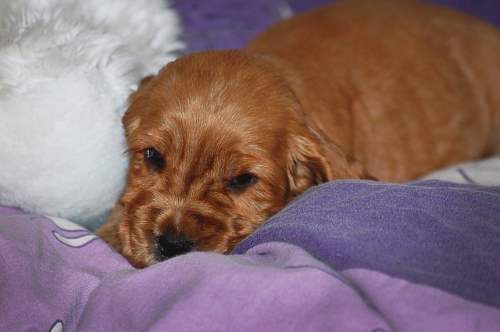 I'm not hungry Mum!
I'm not hungry Mum!On the other hand, if your puppy won't eat but appears otherwise healthy, and is his usual puppy-like self, read on to learn possible causes for his lack of appetite and what you can do to get him eating again.
Important Note:
If you can't tempt your puppy to eat anything for 12-14 hours, you must take him to his vet. If your puppy shows signs of lethargy, has sickness and/or diarrhoea, or seems generally unwell, don't wait to see if he eats.
Take your Cocker Spaniel puppy to see his vet immediately.
Normal Puppy Feeding
At this young age, puppies are growing hard and fast.
Their little bodies need lots of nutrients to help them to develop, and puppy food is specially formulated to do just that.
Puppy tummies are tiny and can't accommodate the food they need daily in one single feed. This is why they must eat up to 4 meals a day, depending on their age.
For example:
- fully weaned puppies and up to 4 months of age: 4 meals each day;
- between 4 months and 6 months of age: 3 meals each day;
- over 6 months of age: 2 meals daily, morning and evening.
The above is for guidance only because all puppies are different.
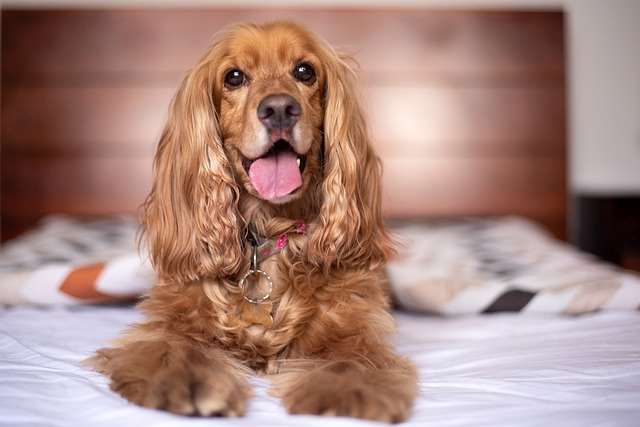 I can't wait for dinner time!
I can't wait for dinner time!If your pup clears his food bowl every mealtime, and he's not looking too chubby, your puppy is doing fine.
If he doesn't eat every last piece of kibble each mealtime, he may not need as much food as you give him. (You may also need to check that you're not overfeeding him).
Puppies shouldn't lose weight, although he may lose his little pot belly at around 12 weeks old. So, if you notice signs of weight loss, speak to your vet and let him check your puppy over.
Why Won't My Puppy Eat?
There could be several reasons why your puppy won't eat. Let's take a look at a few common ones.
Health Issues/Illness
If your puppy isn't eating or drinking, it may be a sign that he's unwell.
He may have an infection or a virus.
He could have an infestation of parasites, worms, for example. Check his poop for worms or for signs of bleeding.
There are other things to consider; does he have diarrhoea, and/or has he been sick?
If you notice any of these, you must take him to see his vet immediately.
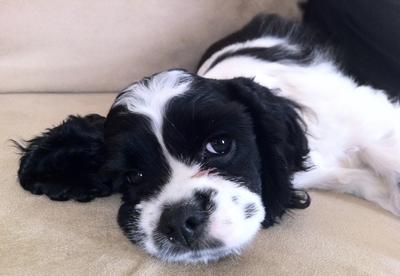 Okay, I'm awake now - what's for dinner?
Okay, I'm awake now - what's for dinner?If Your Puppy Won't Eat, He May Be In Pain
If your puppy is teething, his gums may be causing him considerable pain, and he won't feel like eating.
If teething isn't the problem, but you think this is where the pain is centred, check his mouth for signs of injury or infection.
There's nothing worse than trying to eat when you have a toothache or an ulcer, especially when the food is hard and crunchy!
Consider softening his kibble with a little warm water before you offer it to him, whether it's a teething pain, an injury, or an infection in the mouth. This will make his food easier to eat and not cause him as much pain.
Environmental Stresses
Believe it or not, stress can cause a puppy to lose his appetite, and the family home has many different stressors.
If your puppy has only recently arrived on the scene, his new home will likely be very different from where he was born; strange sights, sounds, smells, and routines.
Getting used to his new environment and changing routines will take some time, and you'll need patience.
Changes within the family home can also cause your puppy to become stressed and lose his appetite.
For example, a new baby arriving on the scene, a family member leaving home, existing or other new pets in the house or even the weather, particularly hot weather, can cause your puppy to stop eating for a while - it's just too darn hot!
I can relate to that, can't you?
My Cocker used to sulk after a short stay in kennels; he wouldn't eat as a protest against being left behind. Mind you, it never lasted very long. Once his tummy started to rumble, that was it. Fasting over!
Be vigilant for signs of stressors and do whatever you can to reduce or remove them from your puppy's environment.
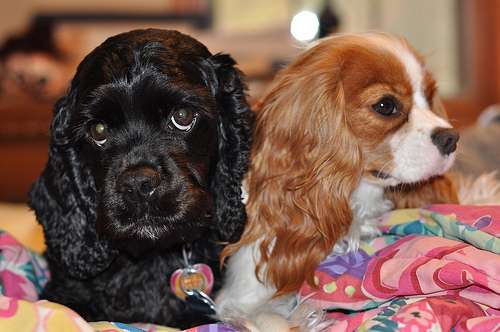
What Can I Do If My Puppy Won't Eat His Food?
Understanding why your puppy isn't eating will help you to get him back on track. For example,
- Is your puppy not eating at all, or will he still eat a treat or two?
- Is he simply skipping a few meals occasionally?
- Is he eating his meals but less than you'd like?
If your puppy is otherwise healthy, skipping a meal or two or not clearing his food bowl may point to an overfeeding issue, or it may be time to drop his eating 4 times a day to 3.
Why Won't My Puppy Eat?
If your puppy won't eat, you may have a fussy eater, or he may not be hungry; it's as simple as that.
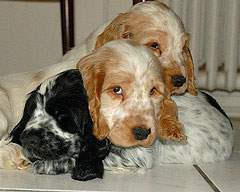 Aren't these puppies sweet?
Aren't these puppies sweet?Overfeeding
If you're feeding your puppy 4 meals a day and are sure you're feeding him the correct amount, he should be ready for his next mealtime when it comes around.
If he continues to turn his nose up at mealtimes, you may be overfeeding him.
Check the puppy food packet for the correct amounts to feed based on your puppy's age. NEVER guess the weight of the puppy kibble; always weigh it.
If you discover you've been overfeeding him, reduce the amount to just below the manufacturer's recommendation. (You often don't need to feed your puppy the amount at the top of the range of recommended feeding amounts - manufacturers want to sell more food more quickly!)
Do this, and you may find that he soon returns to his regular feeding routine.
Remember to consider any treats you and your family give him during the day, as these can contribute to overfeeding and take the edge off his appetite.
Your Puppy Isn't Hungry
If your puppy isn't eating one of his 4 meals a day, and you're confident that you're not overfeeding him, it may be time to drop one of his mealtimes.
Don't Feed Your Puppy Human Food
If your puppy won't eat the kibble you give him, he may turn up his nose to his own food because he prefers yours!
Human food is often tastier and easier to eat than hard, crunchy dry kibble; however, kibble is much better for your puppy, and as I mentioned earlier, it has all the nutrients a growing pup needs.
Add a little gravy or stock to his kibble to tempt him back to his food. You can gradually reduce these extras once he's back on his kibble.
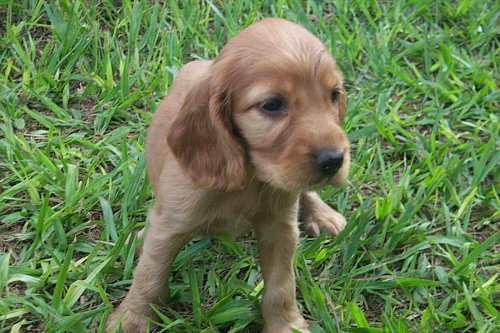 What's for dinner, Mum?
What's for dinner, Mum?Try Feeding Him In His Crate
Your puppy may feel bewildered and/or uncomfortable, especially if there's lots of activity around him; kids are running around, other pets are drooling over his food, etc.
If you think this is why your puppy isn't eating, why not feed him in his crate?
This will slow everything around him and make him feel safe, allowing him to eat his food peacefully.
Hand-Feed Your Puppy
As a last resort if your puppy isn't eating, you could try hand-feeding him for a while, but this should be a last resort; otherwise, he will want to be hand-fed all the time!
I had done this with Max when he was off his food (and all else had failed) until I cottoned onto the fact that whatever was causing his reluctance to eat had passed, and he was now just being lazy (and enjoying the attention)!
Cocker Spaniels are not daft!
Getting him to eat from his bowl took a while, but this is how I managed it.
- After feeding Max several pieces of kibble by hand, I moved on to just holding his food bowl while he ate from it.
- I did the same the following mealtime, but this time I placed the bowl on the floor, but left my hands near the bowl.
- At the next mealtime, after placing the bowl on the floor, I took my hands away.
- After a few days, I began to move away from him, little by little, until he'd forgotten I was there.
Success!
Pep Up His Kibble!
You may be able to tempt your puppy to eat by making it seem more attractive to him.
You can do this in several ways.
- Add a few tablespoons of hot water to soften his kibble, but make sure you allow it to cool before you give it to him.
The best way to deal with a fussy puppy is to give 80% dry and 20% wet, but it MUST be puppy food, not adult dog food.
- Add a little chicken stock (reduced salt, of course).
- Mix in a tablespoon of peanut butter specially formulated for dogs.
- Mix a couple of tablespoons of wet puppy food into his kibble. Remember to reduce the kibble you give him to offset the wet food; otherwise, your pup will gain weight.
- Add a few bits of chopped cooked chicken breast, no skin.
- Mix in a tablespoon of cottage cheese.
- Add half a chopped courgette. Chop and cook in the microwave for 4 minutes and allow to cool before adding.
Courgette is full of fibre and not many calories!
Just remember, any extra food you give your puppy = extra calories! So make sure you remove it when you can, or reduce the amount of kibble to compensate.
Your Puppy's Food
It's best to keep your puppy on the same food the breeder weaned him onto. If you change over now, you're in danger of upsetting his little tummy, causing digestive issues, and increasing his stress levels.
If you can't continue feeding him the same brand, buy a complete meal specially formulated for puppies; regular dog food will not be nutritious enough for him.
If you change your puppy's diet, do it slowly and gradually so you don't upset his stomach.
Remove 10% of his food from his bowl, replace it with 10% of the new food you plan to change over to, and then another 10% the following week.
Continue to do this until you've completely replaced the old food with the new.
Summary: My Puppy Won't Eat
If your puppy won't eat, don't just assume he'll be okay.
Check it out!
Help your puppy to settle into his new environment quickly and quietly.
Keep him calm and reassured. Ensure the children (and other pets) give him enough 'quiet time' to help keep his stress levels down.
Watch what and how often he eats and act accordingly, where necessary, and always ensure he has enough fresh drinking water daily.
Ensure his vaccinations are current and he's wormed, and flea treatment applied monthly.
The most important advice I can give you is to speak to your vet as soon as you notice that your puppy dog won't eat his food.
Nip it in the bud and keep him safe!
You'll find this article on feeding your puppy very helpful and many questions and answers from our visitors on what to feed your puppy.
Visitor Question:
My Puppy Isn't Eating! Do I Need To Worry?
My Puppy Won't Eat - I Need Help
By: Jim (Suffolk)
I have a 5 month old Sprocker Spaniel. He is on the same food he has always been on which is Skinners puppy food with a bit of meat, but he has not been eating all of it up for about 2-3 days. I feed him 3 times a day at present.
He still seems fine in every other way and full of energy. Please advise.
Reply From Pauline (Website Owner)
Hello Jim,
Sorry to hear your puppy's not eating, however, it's good to hear that he's otherwise fit and healthy.
You don't say how much of his food he is leaving? Most of each meal, some of it, or just a little.
If he's only leaving a little each time, I don't think there's anything to worry about - I don't always clear my plate! :-)
I'd keep an eye on how much water he's drinking. Make sure he gets enough, especially if he's fed on kibble as there's not as much water in it as in 'wet' food.
If your Sprocker is nearing 6 months, he may be ready to move to feeding only twice a day.
If I were you, I'd double check that you're giving him the correct amount each time. For example, check the food manufacturer's label for the recommended daily allowance for a puppy dog of his age and/or weight, depending on what they list.
Whatever that allowance is, weight it out (you'd be surprised at how wrong you can be by just guessing!) and divide it into three (or two if you decide he's ready to eat twice a day).
If he's leaving most of his food, even though he seems healthy, I think it might be wise to just have him checked over by his vet - just to be on the safe side.
Also, I recommend you keep an eye on how many treats you give him each day. If you're training him, make sure you reward him with very small treats, or even pieces of his kibble, but take it from his allowance.
If you'd like to read more about feeding a puppy, you can do so here.
Good luck to you both and enjoy your puppy - he won't stay puppy-like for long!
Kind regards,
Pauline
Comments for My Puppy Won't Eat
Puppy Won't Eat
By: Sanchez
Take him to the vets. Puppies should always eat. They need the nourishment to grow and if they're not eating they're not growing.
Puppies can become sick very quickly so it's always best to get them to a vet as soon as you can if you think they may be ill.
I hope your puppy is eating again soon.
Visitor Question: Puppy Isn't Eating All of His Food
My Puppy Isn't Eating All of His Food
By: Jim
From: Suffolk
I have a 5 month old Sprocker Spaniel. He is on the same food he has always been on which is Skinners puppy with a bit of meat, but he has not been eating all of it up for about 2-3 days. I feed him 3 times a day at present.
He still seems fine in every other way and full of energy.
Please advise.
Reply From Pauline (Website Owner)
Hello Jim,
Sorry to hear your puppy's not eating; however, it's good to hear he's fit and healthy.
You don't say how much of his food he is leaving? Is it most of each meal, some of it, or just a little?
If he's only leaving a little each time, I think there's nothing to worry about - I don't always clear my plate! :-)
Keep an eye on how much water he's drinking; ensure he gets enough, especially if he's fed on kibble, as there's less water in it than in 'wet' food.
If your Sprocker is nearing 6 months, he may be ready to eat only twice a day.
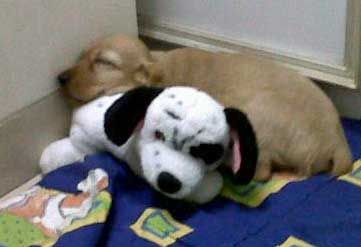 Sleepy head!
Sleepy head!I recommend you double-check that you're giving him the correct amount each time. For example, check the food manufacturer's label for the recommended daily allowance for a puppy dog of his age and/or weight, depending on what they list.
Whatever that allowance is, weigh it out (you'd be surprised at how wrong you can be by just guessing!) and divide it into three (or two if you decide he's ready to eat twice daily).
If he's leaving most of his food, even though he seems healthy, I think having him checked over by his vet might be wise - just to be on the safe side.
Also, I recommend you watch how many treats you give him daily. If you're training him, reward him with tiny treats or even pieces of his kibble, but take it from his allowance.
If you'd like to read more about feeding a puppy, you can do so here.
Good luck to you both, and enjoy your puppy - he won't stay puppy-like for long!
Kind regards,
Pauline
Comments: My Puppy Isn't Eating All His Food
By: Sanchez
Take him to see the vet. Puppies should always eat. They need nourishment to grow; if they're not eating, they're not growing.
Puppies can quickly become sick, so it's always best to get them to a vet as soon as possible if you think they may be ill.
I hope your puppy is eating again soon.
Photo Credits for Puppy Won't Eat:
1. Katrina_S from Pixabay
2. Nao at https://www.istockphoto.com/photo/puppy-gm106542437-536934
3. Visitor photo
4. Visitor photo
5. Visitor photo
6. Clodiney at freeimages.com
7. visitor photo


